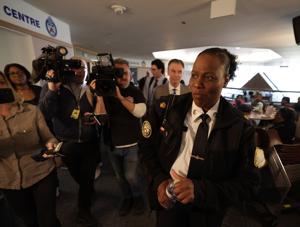
, The above-the-fold Star story and headline on the website made clear that tribunal adjudicator Robin McElary-Downer emphasized “there is no room in policing for noble cause corruption.” One looks forward to the day when Toronto police themselves say there is “no room in policing for corruption,” period. Christmas is coming too, eh? “There is no room in policing for noble cause corruption,” tribunal adjudicator Robin McElary-Downer said in the penalty decision for Supt.
Stacy Clarke, the Toronto police officer who pleaded guilty to seven counts of professional misconduct after admitting she provided exam questions to six Black officers taking part in the sergeant’s promotional process. But who has spoken out about perjury on the stand, racial profiling and use of excessive force from different officers in recent years? Must be no problem. , Justin Ling is justified in speaking truth to mainstream media power.

In the wake of the Holocaust, we vowed “never again” — a solemn oath to prevent such atrocities. Yet now, as we face one of the most gruesome and well-documented conflicts in recent history, mainstream media seems to have effectively silenced concerned citizens, betraying this principle. The media’s reluctance to facilitate open discussion stems from a misguided fear that honest debate will exacerbate tensions rather than reconcile differences.
This approach denies our moral sensibility and disrespects the humanity of all concerned parties. By stifling dialogue, we risk breeding cynicism that favours inaction over engagement. This distrust in our collective humanity is both insulting and unfair.
We, as citizens, have a crucial role to play in addressing complex global issues. Instead of being presumed prejudiced, we should be given the benefit of the doubt as fair-minded individuals capable of nuanced thought. The pledge of “never again” demands active engagement from an informed public.
By fostering constructive dialogue and diverse perspectives, we can honour this commitment and work toward a more just world. It’s time for mainstream media to trust in the wisdom of its audience. , There was a time when Maple Leaf hockey was a close second to city council in importance and the captain of the team was an important member of Toronto political, social and economic society.
Former Leafs Lionel Conacher (known as “The Big Train”), Syl Apps, Ted Kennedy and others were more than hockey, more than players. They were serious responsible civic figures. Toronto has just fired one captain and appointed another.
The ex-captain is known best for his dissatisfaction with being captain. Auston Matthews, the new captain, is known for his playing and for his compensation. Neither of them is known as a strong moral or social force and certainly neither has played a role in the political issues of the day.
Captaincy has returned to its role on the team like baseball, basketball and soccer. Hockey is still important to Toronto but it has lost its magical status and connection to our city. I was recently cycling when a heavy rainfall occurred.
Roads quickly flooded and pooled water began edging up towards driveways and homes. As this happened, I found numerous catch basins clogged with vegetation and garbage. I cleared out the debris and the stormwater abated.
I made this observation and then implemented this easy remedy for many kilometres along my route. Do we really need to spend millions on more flood mitigation or do we simply have to start maintaining what we already have? Underpasses shouldn’t flood. They are designed to keep rainwater from pooling.
But this fails due to lack of maintenance. Instead of paying out money to assist flooded homes why not hire the staff who can ensure stormwater drainage is kept clear and in working order? , Yes, social media is a problem and leads to misinformation but I would argue it has been government policy that has allowed our political system to be as unresponsive and partisan as it has become. Take electoral reform.
In 2015, Prime Minister Justin Trudeau promised to change the electoral system to ensure every vote actually mattered. His government decided not to pursue this matter and yet again we are facing an election where a minority of voters could elect a majority government which, for four years, can do whatever it wants no matter what the opposition says (if they bother saying anything at all) and what the public says. As well, our education system must better prepare young people to participate in democracy.
We should all be finishing high school with a robust knowledge of government and how it works. And where is Elections Canada in all of this? How much have they been doing to educate the public on democracy and why are political debates not mandatory for all candidates during an election in every riding? There are a number of things we must do to combat political apathy. We must publicize the motion and organize public debates on lowering the voting age to 16; teach about decision-making and democracy to children in the elementary grades; organize the educational portion of the National Citizens’ Assembly on Electoral Reform and televise it weekly on CBC; and increase the amount of time spent on public television for political, non-partisan education.
I believe that there are some political strategists who don’t want the population to be fully educated on how our system works..














